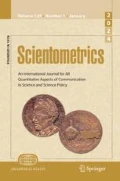Abstract
Debate and controversy concerning the issue of climate change generally results in the hindering and obstruction of social and governmental action on this issue. This paper analyses the scientific background, i.e. the reference list of the IPCC Fifth Assessment Report “The Physical Science Basis” and an alternative climate change report of a US think tank institute “Climate Change Reconsidered II. Physical Science”. We compared these two reports to the antecedent reports from 2007 (IPCC AR4 WGI) and 2009 (Climate Change Reconsidered). For the purposes of the study, we developed a database containing all the references collected from the four reports. The bibliometric analysis focused on the distribution of references among peer reviewed scientific journals and the most frequently cited lead authors that created the basis for the evaluation of their different scientific emphasis. Our findings underline that there is still no convergence between the scientific literature of the IPCC and the contrarian reports; however, the remarkable quantitative development on both sides and the qualitative progress of the IPCC report allows us to draw somewhat surprising conclusions in the context of climate change science. Contrary to expectations, controversy is beneficial to the science of climate change as it fosters the review process on both sides of the debate.
References
Abraham, J. P., Cook, J., Fasullo, J. T., Jacobs, P. H., Mandia, S. A., & Nuccitelli, D. A. (2014). Review of the consensus and asymmetric quality of research on human-induced climate change. Cosmopolis, 5(1), 3–18.
Benestad, R. E., Nuccitelli, D., Lewandowsky, S., et al. (2016). Learning from mistakes in climate research. Theoretical an Applied Climatology, 126(3), 699–703. doi:10.1007/s00704-015-1597-5.
Bjurström, A., & Polk, M. (2011a). Physical and economic bias in climate change research: A scientometric study of IPCC Third Assessment Report. Climatic Change, 108, 1–22.
Bjurström, A., & Polk, M. (2011b). Climate change and interdisciplinarity: A co-citation analysis of IPCC Third Assessment Report. Scientometrics, 87, 525–550.
Boussalis, C., & Coan, T. G. (2016). Text-mining the signals of climate change doubt. Global Environmental Change, 36, 89–100.
Cook, J., Nuccitelli, D., Green, S. A., Richardson, M., Winkler, B., Painting, R., et al. (2013). Quantifying the consensus on anthropogenic global warming in the scientific literature. Environmental Research Letters, 8(2), 024024. doi:10.1088/1748-9326/8/2/024024.
Dunlap, R. E., & McCright, A. M. (2015). Challenging climate change: The denial countermovement. In R. E. Dunlap & R. J. Brulle (Eds.), Climate change and society: Sociological perspectives (pp. 300–332). Oxford: Oxford University Press.
Grundmann, R. (2015). Climate skepticism. In K. Bäckstrand & E. Lövbrand (Eds.), Research handbook on climate governance (pp. 175–187). Northampton: Edward Elgar Publishing.
Hampel, M. (2016). Have climate sceptics taken the bait? What the deconstruction of instrumental climate records can tell us about the politics of climate change. Area, 48(2), 244–248.
Idso, C., & Singer, S. F. (2009). Climate change reconsidered. Report of the nongovernmental international panel on climate change (NIPCC). Chicago, IL: The Heartland Institute.
Idso, C. D., Carter, R. M., & Singer, S. F. (Eds.). (2013). Climate change reconsidered II: Physical science (p. 993). Chicago, IL: The Heartland Institute.
IPCC. (2007). Climate change 2007: The physical science basis. Contribution of working group I to the fourth assessment report of the intergovernmental panel on climate change. In S. Solomon, D. Qin, M. Manning, Z. Chen, M. Marquis, K. B. Averyt, M. Tignor, & H. L. Miller (Eds.). Cambridge and New York, NY: Cambridge University Press.
IPCC. (2013). Climate change 2013: The physical science basis. Contribution of working group I to the fifth assessment report of the intergovernmental panel on climate change. In T. F. Stocker, D. Qin, G.-K. Plattner, M. Tignor, S. K. Allen, J. Boschung, A. Nauels, Y. Xia, V. Bex, & P. M. Midgley (Eds.). Cambridge and New York, NY: Cambridge University Press.
Jankó, F., Móricz, N., & Papp-Vancsó, J. (2014). Reviewing the climate change reviewers: Exploring controversy through report references and citations. Geoforum, 56, 17–34. doi:10.1016/j.geoforum.2014.06.004.
Marx, W., Haunschild, R., Thor, A., et al. (2017). Which early works are cited most frequently in climate change research literature? A bibliometric approach based on reference publication year spectroscopy. Scientometrics, 110, 335. doi:10.1007/s11192-016-2177-x.
Medimorec, S., & Pennycook, G. (2015). The language of denial: Text analysis reveals differences in language use between climate change proponents and skeptics. Climatic Change, 133(4), 1–9.
Nordlund, G. (2008). Futures research and the IPCC assessment study on the effects of climate change. Futures, 40, 873–876.
Pearce, W., Brown, B., Nerlich, B., & Koteyko, N. (2015). Communicating climate change: Conduits, content, and consensus. Wiley Interdisciplinary Reviews-Climate Change, 6(6), 613–626.
Ryghaug, M., & Skjølsvold, T. M. (2010). The global warming of climate science: Climategate and the construction of scientific facts. International Studies in the Philosophy of Science, 24(3), 287–307. doi:10.1080/02698595.2010.522411.
Tol, R. S. J. (2016). Comment on ‘quantifying the consensus on anthropogenic global warming in the scientific literature’. Environmental Research Letters, 11, 048001. doi:10.1088/1748-9326/11/4/048001.
Vasileiadou, E., Heimeriks, G., & Petersen, A. C. (2011). Exploring the impact of the IPCC Assessment Reports on science. Environmental Science and Policy, 14, 1052–1061.
Acknowledgements
We are thankful for the reviewer’s help and suggestions, which improved our study. Our paper was supported by the János Bolyai Research Scholarship of the Hungarian Academy of Sciences (Jankó). Funding for this study was also provided by a project called Agroclimate. 2 VKSZ_12-1-2013-0034 (Papp Vancsó and Móricz).
Author information
Authors and Affiliations
Corresponding author
Rights and permissions
About this article
Cite this article
Jankó, F., Papp Vancsó, J. & Móricz, N. Is climate change controversy good for science? IPCC and contrarian reports in the light of bibliometrics. Scientometrics 112, 1745–1759 (2017). https://doi.org/10.1007/s11192-017-2440-9
Received:
Published:
Issue Date:
DOI: https://doi.org/10.1007/s11192-017-2440-9

